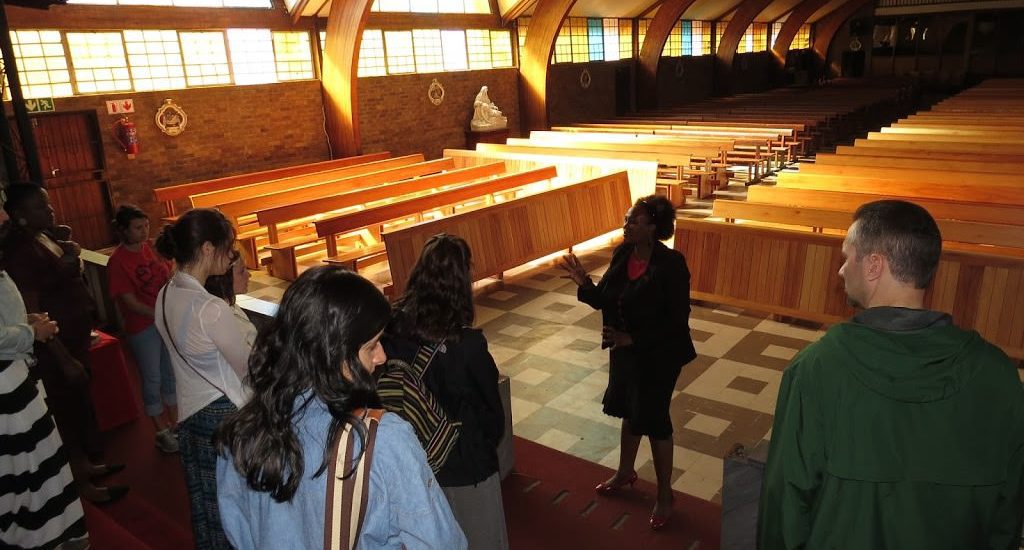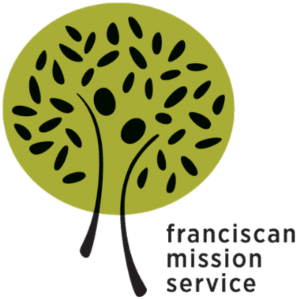Trip Partcipants Learn About Catholic Church’s Fight Against Apartheid

Fr. Dominic Hession is an Irish Franciscan Friar who has been in South Africa for more than 40 years. By the time our recent Short-Term Missions and Global Awareness group met him, he had already seen the rise and fall of the brutal Apartheid as a priest blacklisted for speaking out against the government’s practices.
As the group of Americans gathered for prayer and meals at La Verna Retreat Centre outside of Johannesburg, the stories Fr. Dominic told of riots, violence and injustice seemed a long ways away from those peaceful grounds along the Vaal River.
“This was perhaps one of the strongest moments of our time in South Africa,” Mariam Mitry, FMS associate director and trip co-facilitator, said. “He gave an insider’s perspective of the abuse and corruption that was occurring during apartheid, and the persecution he faced when he became a voice against the injustice.”
The group of eight students from the University of Georgia, St. Bonaventure University and Siena College, spent two weeks in South Africa where they learned about the history of the country and apartheid and the consequences of its systematic oppression.
“Because Fr. Dominic represents the Church in many ways, it gave the students a positive view of how the Church and religious were critical in fighting apartheid and conveyed it as our mission as Christians,” Mariam said.
Other examples of the Church’s work against systemic injustice were evident in the sites the group visited throughout the trip. From the professional and trade careers taught at St. Anthony’s Education Centre, to the spirited Masses with young adults in the Kanana Township, they witnessed the aftermath of the government’s abusive history and what fellow Catholics are doing about it.
“I was overwhelmed and in awe of the presence that I was surrounded by throughout the trip through the religious leaders that we have met that have fought against the apartheid and the HIV/AIDS pandemic in the area,” Audrey Sabatini, a student from Siena College, said.
Take Fr. Dominic and his story about the tension between the South African Catholic church and Afrikaan authorities as an example. After being denied re-entry into South Africa, he was removed from the “blacklist” by an Afrikaaner who called him for a meeting after his re-entrance. The Afrikaaner told him to only preach the word of God, not politics. Fr. Dominic responded, “The first page of the Bible that sits on your table says men and women were created in the image of God, without mention of race. I am not preaching politics. I’m preaching the word of God.”
The struggle is still evident; the fight still being fought for racial and economic equality. For many locals, from the trip’s guides to historical figures like Archbishop Desmond Tutu, the road to recovery is walked in reconciliation.
“This trip revealed in a concrete way how the presence of God is working through the people of South Africa,” Mariam said. “Now, those who fought to end apartheid are trying to keep the spirit alive in the next generation who have not experienced these horrible events.” Perhaps our student group will be among other young adults who bring awareness to the oppression still alive in South Africa and around the world.
If you would like to take your group on a Short-Term Missions and Global Awareness Trip to South Africa, visit our website for more information.
As the group of Americans gathered for prayer and meals at La Verna Retreat Centre outside of Johannesburg, the stories Fr. Dominic told of riots, violence and injustice seemed a long ways away from those peaceful grounds along the Vaal River.
“This was perhaps one of the strongest moments of our time in South Africa,” Mariam Mitry, FMS associate director and trip co-facilitator, said. “He gave an insider’s perspective of the abuse and corruption that was occurring during apartheid, and the persecution he faced when he became a voice against the injustice.”
The group of eight students from the University of Georgia, St. Bonaventure University and Siena College, spent two weeks in South Africa where they learned about the history of the country and apartheid and the consequences of its systematic oppression.
“Because Fr. Dominic represents the Church in many ways, it gave the students a positive view of how the Church and religious were critical in fighting apartheid and conveyed it as our mission as Christians,” Mariam said.
Other examples of the Church’s work against systemic injustice were evident in the sites the group visited throughout the trip. From the professional and trade careers taught at St. Anthony’s Education Centre, to the spirited Masses with young adults in the Kanana Township, they witnessed the aftermath of the government’s abusive history and what fellow Catholics are doing about it.
“I was overwhelmed and in awe of the presence that I was surrounded by throughout the trip through the religious leaders that we have met that have fought against the apartheid and the HIV/AIDS pandemic in the area,” Audrey Sabatini, a student from Siena College, said.
Take Fr. Dominic and his story about the tension between the South African Catholic church and Afrikaan authorities as an example. After being denied re-entry into South Africa, he was removed from the “blacklist” by an Afrikaaner who called him for a meeting after his re-entrance. The Afrikaaner told him to only preach the word of God, not politics. Fr. Dominic responded, “The first page of the Bible that sits on your table says men and women were created in the image of God, without mention of race. I am not preaching politics. I’m preaching the word of God.”
The struggle is still evident; the fight still being fought for racial and economic equality. For many locals, from the trip’s guides to historical figures like Archbishop Desmond Tutu, the road to recovery is walked in reconciliation.
“This trip revealed in a concrete way how the presence of God is working through the people of South Africa,” Mariam said. “Now, those who fought to end apartheid are trying to keep the spirit alive in the next generation who have not experienced these horrible events.” Perhaps our student group will be among other young adults who bring awareness to the oppression still alive in South Africa and around the world.
If you would like to take your group on a Short-Term Missions and Global Awareness Trip to South Africa, visit our website for more information.
Tagged in:


